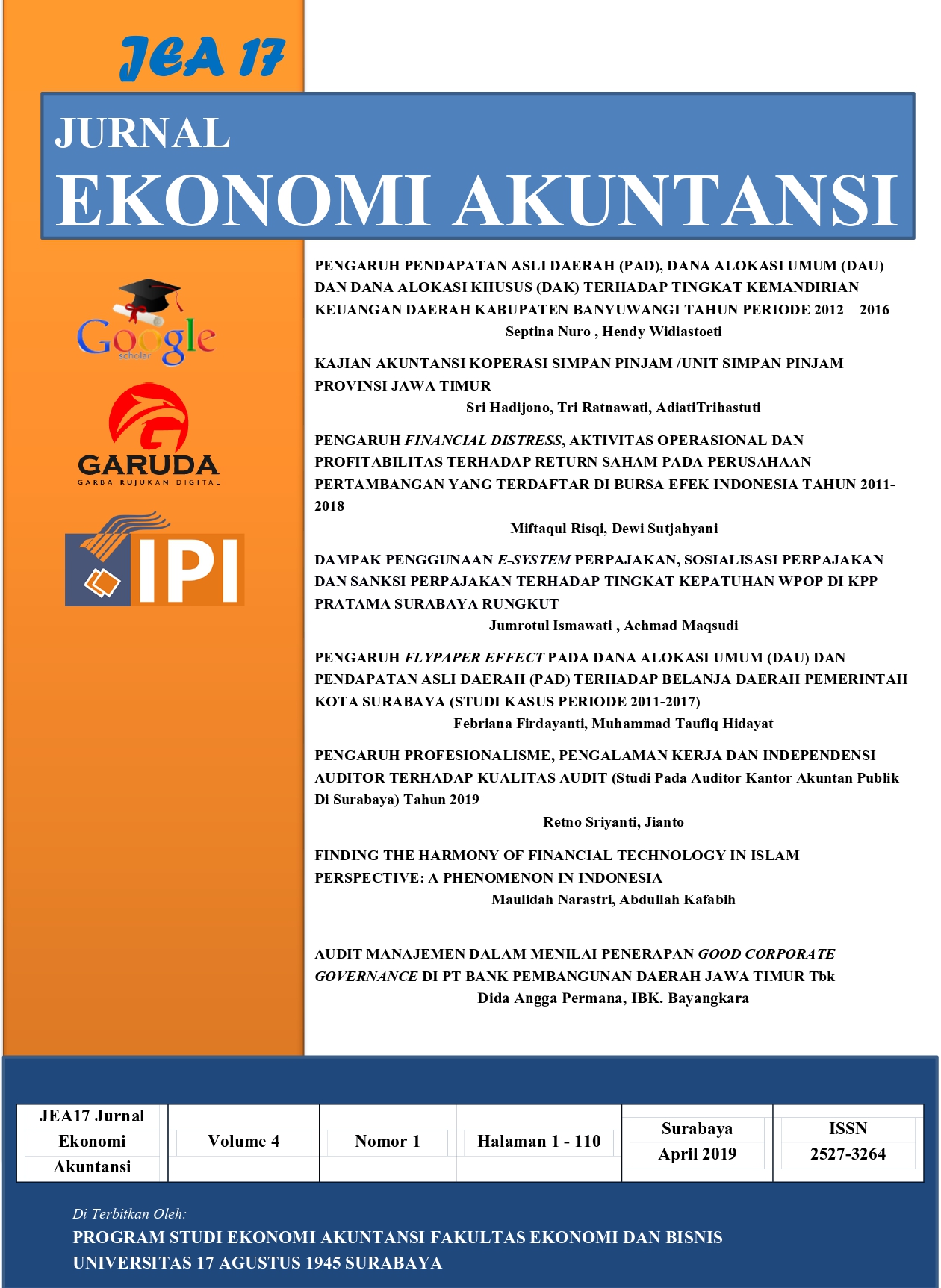PENGARUH PENDAPATAN ASLI DAERAH (PAD), DANA ALOKASI UMUM (DAU) DAN DANA ALOKASI KHUSUS (DAK) TERHADAP TINGKAT KEMANDIRIAN KEUANGAN DAERAH KABUPATEN BANYUWANGI TAHUN PERIODE 2012 – 2016
DOI:
https://doi.org/10.30996/jea17.v4i01.3284Abstract
ABSTRACT
The purpose of this research is to know whether there is influence of Local Original Income (PAD), General Allocation Fund (DAU) and Special Allocation Fund (DAK) to the level of Financial Independence of Banyuwangi Regency year 2012 - 2016 either partially or simultaneously. The population in this research is Banyuwangi Regency using secondary data in the form of Budget Realization Report (BRR) of Banyuwangi Regency in 2012 - 2016. Hypothesis testing in this research use multiple linear regression with t test, F test and coefficient of determination. The data that have been collected is analyzed first by testing the classical assumption then hypothesis tested by SPSS 20.0. Based on the research results can be concluded that the partial variable PAD has a significant effect, while the variable DAU and DAK have no significant effect on the level of regional financial independence. Simultaneously, PAD, DAU and DAK variables significantly influence the level of local financial independence.
Keywords
:
Local Own Revenue, General Allocation Fund, Special Allocation Fund and Local Financial Independence Level.
Downloads
References
DAFTAR PUSTAKA
Bastian, Indra. 2003. Akuntansi Sektor Publik di Indonesia, Pusat Pengembangan Akuntansi. Yogyakarta : Universitas Gajah Mada.
Erawati, Nyoman Trisna., Leny Suzan. 2015. Pengaruh Pendapatan Asli Daerah Terhadap Tingkat Kemandirian Keuangan Daerah Kota Bandung. E-Proceeding of Management : ISSN 2355-9357.
Ersyad, Muhammad. 2011. Pengaruh Pendapatan Asli Daerah, Dana Alokasi Umum, Dana Alokasi Khusus terhadap Tingkat Kemandirian Keuangan Daerah (Studi Empiris pada Kabupaten dan Kota di Sumatera Barat). Padang : Skripsi FE UNP
Fauzan, Muhammad. 2006. Hukum Pemerintahan Daerah Kajian Tentang Hubungan Keuangan Antara Pusat dan Daerah. Yogyakarta : UII Press.
Halim, Abdul. 2002. Akuntansi Keuangan Daerah, Edisi 3 Akuntansi Sektor Publik. Jakarta : Salemba Empat.
Hassel, Nogi S. Tangkilisan. 2007. Manajemen Publik. Jakarta : Grassindo
Mardiasmo. 2002. Akuntansi Sektor Publik. Yogyakarta : Andi.
Republik Indonesia, 2004. Undang - Undang No 32 Tahun 2004 Tentang Pemerintah Daerah.
Republik Indonesia, 2004. Undang - Undang No 33 Tahun 2004 Tentang Perimbangan Keuangan antara Pemerintah Pusat dan Pemerintah Daerah.
Website.https://www.banyuwangikab.go.id/media/perencanaan_anggaran/pdf/BAB_II_GAMBARAN_UMUM_KONDISI_DAERAH.
Website https://banyuwangitourism.com/Detail_destination
Website https://www.banyuwangikab.go.id/profil/sejarah-singkat.html
Website https://www.banyuwangikab.go.id/profil/gambaranumum.html
Website https://www.banyuwangikab.go.id/profil/kependudukan-dan-naker.html
Website https://www.banyuwangikab.go.id/profil/ekonomi.html
Website https://www.banyuwangikab.go.id/profil/profil-kesehatan.html
Website https://www.banyuwangikab.go.id/profil/profil-pendidikan.html
Widiasih, Ni Nyoman., Gayatri. 2017. Pengaruh Pendapatan Asli Daerah, Dana Alokasi Umum, Dana Bagi Hasil Pada Belanja Modal Kabupaten/Kota di Provinsi Bali. E-Jurnal Akuntansi Universitas Udayana : ISSN 2302-8556.
Downloads
Published
Issue
Section
License
Authors whose manuscript is published will approve the following provisions:
- The right to publication of all journal material published on the JEA17: Jurnal Ekonomi Akuntansi website is held by the editorial board with the author's knowledge (moral rights remain the property of the author).
- The formal legal provisions for access to digital articles of this electronic journal are subject to the terms of the Creative Commons Attribution-ShareAlike (CC BY-SA) license, which means JEA17: Jurnal Ekonomi Akuntansi reserves the right to store, modify the format, administer in the database, maintain and publish articles without requesting permission from the Author as long as it keeps the Author's name as the owner of Copyright.
- Printed and electronically published manuscripts are open access for educational, research, and library purposes. In addition to these objectives, the editorial board shall not be liable for violations of copyright law.











